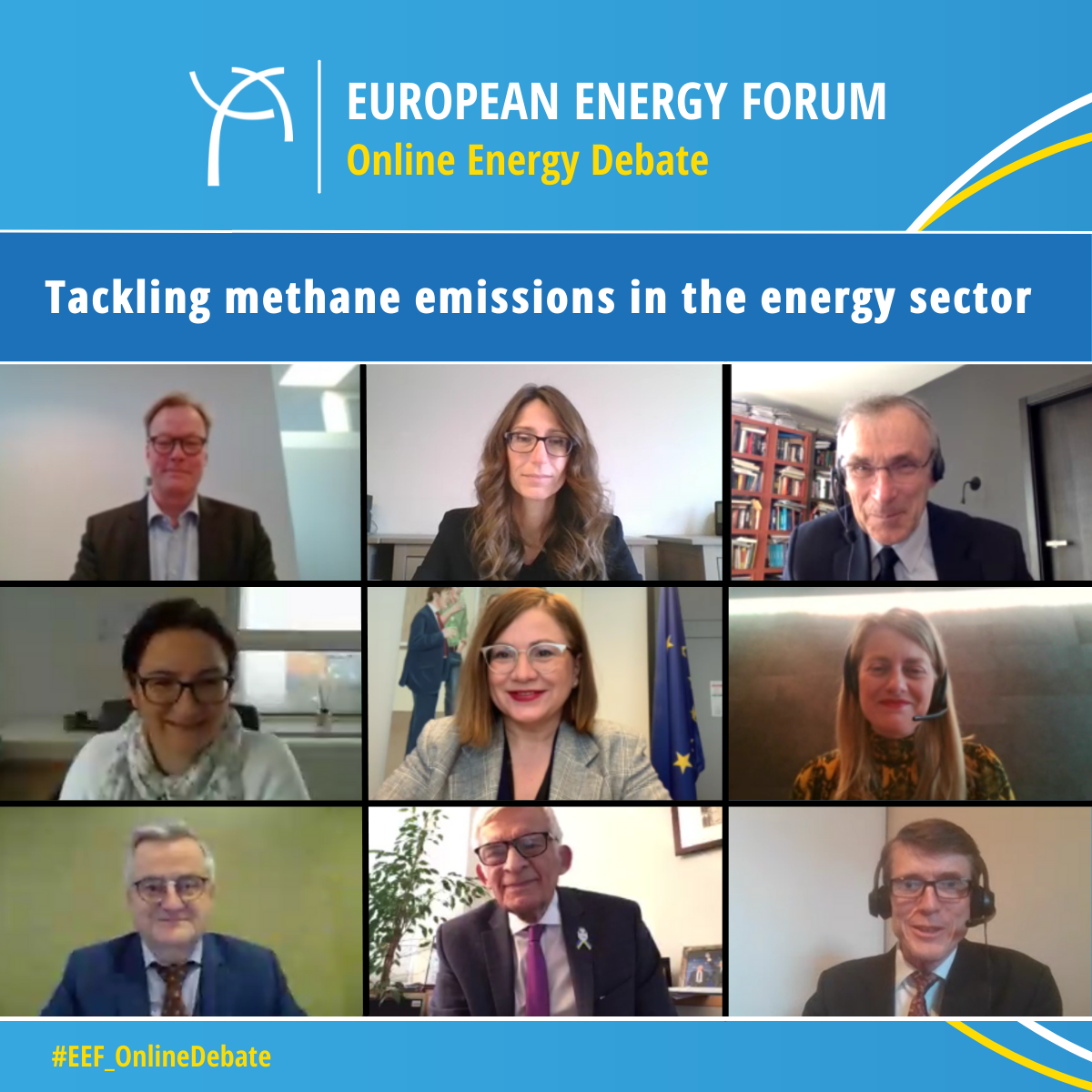Tackling methane emissions in the energy sector
Co-Chairs:
MEP Jerzy Buzek (EPP, Poland), President of the EEF
MEP Maria Spyraki (EPP, Greece), Director of the EEF
Panel:
Lucie Boost, EU Affairs Manager, Equinor
Axel Scheuer, Senior Policy Manager, IOGP
Andris Piebalgs, Senior Fellow, Florence School of Regulation
Kitti Nyitrai, Head of Unit Decarbonisation and Sustainability of Energy Sources, DG ENER, European Commission
Moderator:
Pascale Verheust, Director General of the EEF
EEF Director MEP Maria Spyraki, ENVI Shadow Rapporteur on tackling methane emissions in the energy sector chaired the EEF Online Debate to discuss the proposed EU Regulation.
When opening the discussion, Ms Spyraki stressed how crucial it is to address methane emissions in the energy sector to reduce global warming – as they are second only to CO2 -, as well as the importance of promoting action both at the European and global level.
Lucie Boost, EU Affairs Manager, Equinor presented some data on methane intensity along the gas value chain in the Norwegian Continental Shelf (NCS): 0.01 in the upstream, <0.01 in the midstream, and 0.31 in the downstream. She explained this is due to different factors, among with technology, the facility design, specific local factors – the NCS being relatively close to the offtake locations – and regulation. Ms Boost explained that measuring methane emissions with precision is difficult. In the NCS region, this is done through a specific bottom-up model whose results are used by NGOs and civil societies as a basis for their own reports and computing, which however come to different conclusions. She finally underlined the relevance of NCS best practice based on cooperation between public and private sectors which allows to identify all the emission sources and quantify them, resulting in the above mentioned relatively low methane intensity figures.
The discussion continued with Axel Scheuer, Senior Policy Manager, IOGP who first clarified that methane emissions are a concern for the oil and gas industry, which has an inherent incentive to avoid them. While acknowledging the need for an accurate, globally consistent and verified monitoring, reporting and verification framework, he reiterated existing methane emissions detecting technologies have limitations. Until a consistent measurement method is found, standards and targets on methane emissions reduction shall not be established. As for the proposed EU regulation, Mr Scheuer suggested establishing proportionality and materiality criteria; adopting a technology open approach, reducing complexity, clarifying roles and responsibilities as well as some key terms, such as “direct measurement” of source-level emissions and “quantification of emissions”.
Former Commissioner Andris Piebalgs, now Senior Fellow at the Florence School of Regulation and Chair of the IMEO Implementation Committee presented two problems which have traditionally hindered discussions on methane emissions: the underestimation of their polluting potential and the technological gap which has led to think methane emissions are lower than they are. Better data is thus key to scaling and speeding up action to limit methane emissions. That is how it is so crucial to have a credible source of information like the IMEO (International Methane Emissions Observatory), who will provide transparent science-based data. Mr Piebalgs also mentioned the importance of the Global Methane Pledge signed during COP26 and tackling emissions in all sectors, from energy to agriculture and waste, and at global level. He finally expressed his positiveness towards the proposed regulation.
Kitti Nyitrai, Head of Unit Decarbonisation and Sustainability of Energy Sources, DG ENER, European Commission first said she is happy to see the file is moving quicklier than previewed. She then highlighted the importance of evaluating the cost-effectiveness of the proposed regulation for the whole society, not only for businesses. Tackling methane emissions is in fact a win-win, as it both improves air quality and allows companies to re-use non-emitted methane for energy production. Ms Nytrai agreed on the need to quickly improve the monitoring, reporting and verification (MRV) of methane emissions. She explained that the absence of specific targets in the proposed regulation depends on the lack of an accurate picture on methane emissions. Instead of setting targets, the Commission preferred to focus on achieving results through improved gathering of data and the large-scale application of already existing industry’s best practices.
The EEF President MEP Jerzy Buzek joined our Chair for an open Q&A with the audience and the speakers. The exchange touched upon the ban on venting and flaring of methane in coal mines, the development of an appropriate and science-based quantification methodology for methane emissions, the need for clearer definitions in the proposed regulation as well as the importance of avoiding excessive costs both for the industry and the final consumers.



